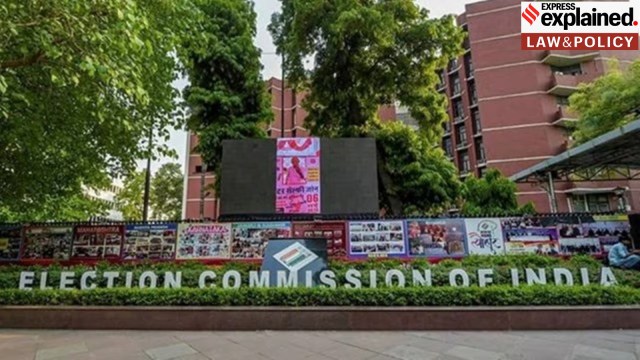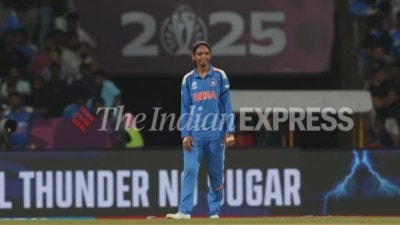Why did the SC refuse to stay the appointments of two election commissioners?
How did the recent law to appoint Election Commissioners come into being? Why were the appointments and the law challenged? On what grounds can the Supreme Court stay a legislation?
 Gujarat had the highest amount of seizures among all states and Union Territories, with Rs.1,461.73 crore in total seizures. (Express Archives)
Gujarat had the highest amount of seizures among all states and Union Territories, with Rs.1,461.73 crore in total seizures. (Express Archives)The Supreme Court on Thursday (March 21) dismissed applications challenging the appointment of retired IAS officers Gyanesh Kumar and Sukhbir Singh Sandhu as election commissioners (ECs). It also declined to stay the Chief Election Commissioner And Other Election Commissioners (Appointment, Conditions of Service and Term of Office) Act, 2023, under which the appointments were made.
The Bench of Justices Sanjiv Khanna and Dipankar Datta said staying the appointments at this juncture, with the elections set to take place shortly, would cause chaos and uncertainty.
The NGO Association for Democratic Reforms had pleaded for the appointments to be stayed, as part of the ongoing challenge against the EC Act.
How did the law come into being? Why were the appointments and the law challenged? On what grounds can the Supreme Court stay a legislation?
How did the system of appointments come into existence?
In March 2023, in the case of Anoop Baranwal v Union of India, a five-judge Constitution Bench modified the process of appointing members of the Election Commission of India (ECI), to ensure its independence. Prior to this judgement, the Chief Election Commissioner (CEC) and the Election Commission (ECs) were appointed directly by the President on the advice of the Prime Minister.
The SC, as an interim solution, constituted a committee comprising the Prime Minister, the Leader of the Opposition in the Lok Sabha, and the Chief Justice of India to make the appointments. The Bench also noted that Article 324(2) places an obligation on Parliament to enact a law for this purpose.
The law was enacted in December 2023, and replaced the CJI with “a Union Cabinet Minister to be nominated by the Prime Minister” as a selection committee member. This effectively gives the central government a majority vote in the selection of ECs and CECs.
Why was the EC Act challenged?
On January 2 this year, Dr. Jaya Thakur (a medical professional and member of the Indian National Congress) filed a petition in the Supreme Court challenging the constitutionality of the selection committee created under Section 7 of the EC Act.
In her petition, Dr. Thakur claimed that the EC Act directly contradicts the SC judgement in Anoop Baranwal by allowing the ruling party at the Centre to be the “deciding factor” in the appointment process, compromising the independence of the ECI and the right to free and fair elections. Days later, ADR filed a petition and joined Dr. Thakur in the challenge against the EC Act.
In the past, the Supreme Court has struck down laws for being contrary to judgements its has passed. For instance, in July 2021, the court struck down the Tribunals Reforms (Rationalisation and Conditions of Service) Ordinance, 2021 for introducing several provisions regarding the service conditions of Tribunal members that were similar to those struck down in November 2020.
The court listed the hearing on ADR’s application for March 15, on the same date the selection committee under the EC Act was scheduled to meet for recommending appointments to two vacant EC posts. However, the selection committee met a day earlier and appointed two new Election Commissioners, Gyanesh Kumar and Sukhbir Singh.
The Election Commission had two vacancies after the surprise resignation of Election Commissioner Arun Goel on March 9. The poll body was thus left with only one member, CEC Rajiv Kumar, just days before the Lok Sabha poll dates were expected to be announced.
On March 15, ADR filed an application seeking a stay on the appointments. In their application, ADR claimed that the central government “pre-empting the adjudication by this Hon’ble Court…has convened a meeting of the Selection Committee on 14.03.2024”, in order to render their earlier application infructuous by appointing ECs before the Supreme Court could determine the correct process for doing so.
ADR also submitted that the Leader of Opposition Adhir Ranjan Chowdhury “had sought the names of the shortlisted candidates however none was provided to him in advance. This means that no time was given to all the members of the Selection to consider the shortlisted names and evaluate the competencies of the shortlisted candidates.”
How did the Centre respond to the allegations?
The Centre on March 20 told the SC that the independence of the Election Commission “does not arise from” the presence of a judicial member in the selection committee. “To indicate… that selection committees without judicial members would invariably be biased is wholly incorrect,” it said.
On the NGO’s claim that the selection committee meeting was preponed to March 14, to “pre-empt” the SC’s order the next day, the government said the meeting had been rescheduled on March 9 itself in view of Arun Goel’s resignation. There was “no attempt whatsoever to pre-empt the judicial process in any manner whatsoever,” it said.
About Chowdhury getting the names too late, the government said he was handed a list of candidates under consideration on March 13, but the shortlist could not be provided as the search committee had not completed its process.
When can the SC stay a legislation?
In the current case, the SC refused to stay Section 7 of the EC Act, saying laws cannot be stayed unless under “exceptional circumstances”.
Stays on laws enacted by Parliament are rare as they benefit from a “presumption of constitutionality” — a legal principle dictating that a law is valid until proven that it violates the Constitution.
This principle was explained by the Supreme Court in Bhavish D. Parish v. Union of India (2000), which held, “When considering an application for staying the operation of a piece of legislation…the courts must bear in mind that unless the provision is manifestly unjust or glaringly unconstitutional, the courts must show judicial restraint in staying the applicability of the same. Merely because a statute comes up for examination and some arguable point is raised, which persuades the courts to consider the controversy, the legislative will should not normally be put under suspension pending such consideration.”
- 01
- 02
- 03
- 04
- 05






































